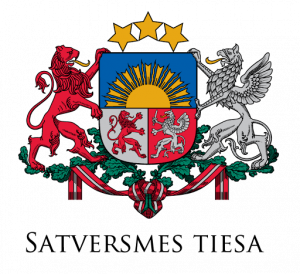Dialogue between the Constitutional Courts of the Baltic States strengthens the rule of law and the protection of fundamental rights of every citizen in the region
On 23-25 May, a trilateral cooperation meeting was held with the participation of judges of the Constitutional Court of Latvia, the Constitutional Court of Lithuania and the Supreme Court of Estonia. The Constitutional Court of Latvia was represented by its President Aldis Laviņš, Vice-President Irēna Kucina, Judges Anita Rodiņa and Jautrīte Briede, as well as the Adviser to the President Andrejs Stupins. The Baltic Judicial Cooperation Meeting was held in Tartu on the occasion of the 30th anniversary of the re-establishment of the Supreme Court of Estonia. During the working sessions, the judges of the Constitutional Court of Latvia made presentations on the application of European Union law, constitutional guarantees for judges after their dismissal from office, as well as current case-law.
In his opening address, President of the Constitutional Court of Latvia Aldis Laviņš emphasised the importance of cooperation between the constitutional courts of the Baltic States in protecting common values and democracy: “It is remarkable that the third tripartite meeting is taking place in Tartu, the cradle of Baltic science. Tartu University has graduated many outstanding Latvian lawyers of the inter-war period. In the current geopolitical challenges, cooperation between the Constitutional Courts of the Baltic States is stronger than ever. Times of crisis weaken the weak but strengthen the strong. Only by working together have we achieved the exclusion of the Constitutional Court of the aggressor state Russia from the international family of Constitutional Courts, as well as gained support for the representation of the interests of the region in the Bureau of the World Conference on Constitutional Justice, where the Constitutional Court of Latvia will continue the course initiated by its Lithuanian colleagues for the restoration of the international legal order. Dialogue and cooperation between the constitutional courts of the Baltic States is an essential prerequisite for strengthening the sustainability of democracy and the rule of law and the protection of fundamental rights and human dignity.”
In the working sessions of the meeting, the judges made presentations on topical issues of constitutional law. In his presentation, Aldis Laviņš highlighted the most important manifestations of how constitutional courts operate in the field of the application of European Union law, as well as the discussion on the temporal aspects of the invalidity of national legislation that is contrary to EU law. In several cases, the Constitutional Court of Latvia has specified the content of the fundamental rights guaranteed by the Constitution in relation to the legal acts of the European Union. Likewise, when assessing the proportionality of a restriction on a fundamental right, the constitutional courts may clarify the obligations and the extent of the discretion conferred on the Member State in accordance with the rules of European Union law. Also, in accordance with the principle of good lawmaking as specified by the Constitutional Court of Latvia, the legislator must assess the data protection requirements set out in the European Union legislation when adopting legal norms. Such an assessment is necessary to ensure that the measure chosen by the legislator does not contravene the principle of the loyalty of the Member States of the European Union and hinder the achievement of the objectives of the European Union. Namely, the Constitutional Court is obliged to ensure the application of such European Union legal provisions that strengthen Latvia as a democratic state based on the rule of law and inherent dignity and freedom of every human being.
Vice-President of the Constitutional Court of Latvia Irēna Kucina at the session on constitutional guarantees for judges after their dismissal from their office, she stressed the fundamental importance of such guarantees in order to ensure that the regulation, practical implementation and administrative management of the dismissal of judges are not subject to continuous reforms and do not jeopardise the independence of judges. “The Constitutional Court, interpreting the constitutional norms that protect a judge against any external influence, has concluded that the obligation not to interfere applies not only to the legislator and the executive, but also to the court itself and officials related to the exercise of judicial power. The Law “On Judicial Power” is the main normative act that establishes the framework and principles governing the functioning and organisation of the judicial system,” explained Irēna Kucina.
In her presentation, Judge of the Constitutional Court of Latvia Anita Rodiņa provided an insight into the current case law of the Constitutional Court, particularly highlighting cases related to the protection of democratic values, as well as issues of environmental sustainability. She concluded her presentation by drawing attention to the role of the Constitutional Court of Latvia in consolidating and protecting common values: “For more than 27 years, the Constitutional Court of Latvia has consistently fulfilled its task – to improve the legal system by providing its assessment on issues of constitutional importance. The Constitutional Court of Latvia is not only an enforcer of the law, but also a teacher of society, constantly reminding us of the values that are common and important to every individual and to society as a whole.”
Close cooperation with the Constitutional Court of Lithuania and the Supreme Court of Estonia is an essential part of the international cooperation of the Constitutional Court of Latvia, the aim of which is to maintain an up-to-date discussion on issues of constitutional law at the national and European level, as well as to strengthen the judicial dialogue in the Baltic States.




